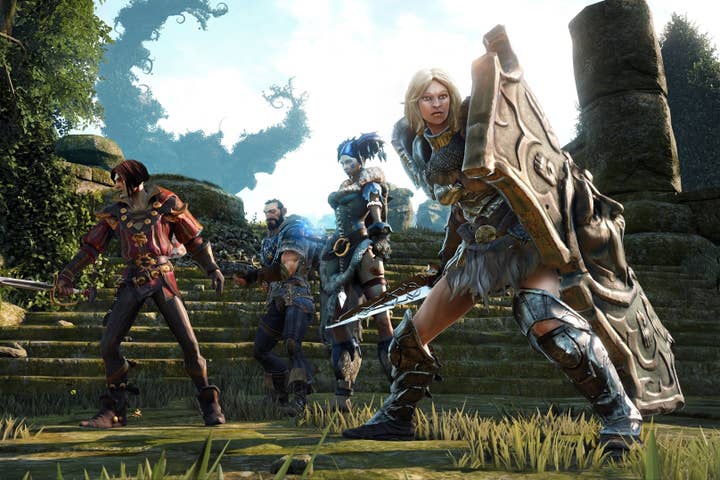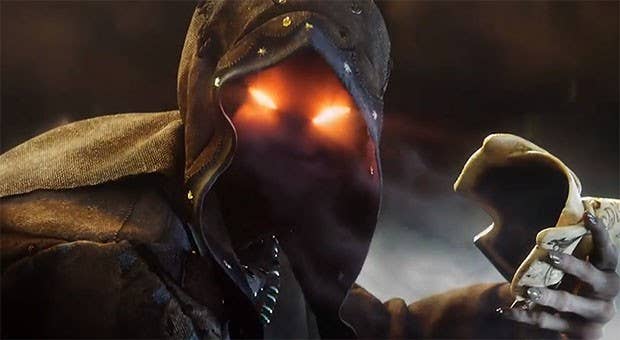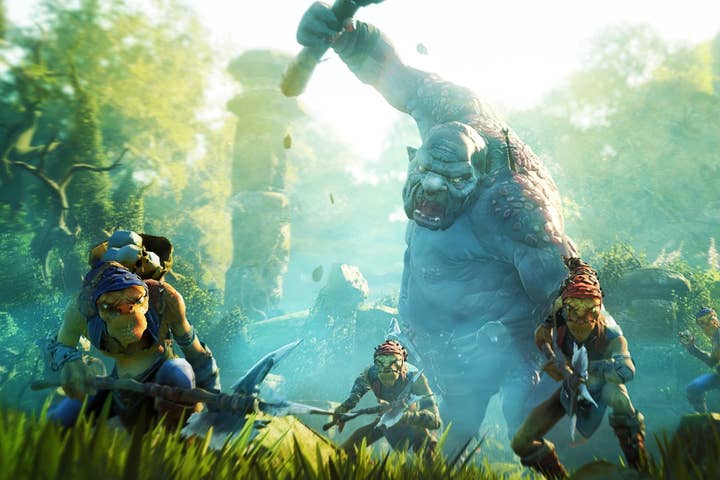The Lion's Den: Meet The New Team Behind Fable Legends
John Needham is playing the long game with a 10-year plan for Xbox One's adventure in Albion
There's a hushed revolution happening in Fable's Albion. At its home, Lionhead studios, there's a quiet intensity, a new set of faces and a new machine all hard at work trying to make sure that the next game in the series, Fable Legends, is innovative, exciting, ready for an online world, but still all those things that make it Fable.
How does a studio hang on to what made its games so special, and its identity, while faced with updating a classic franchise for the online world? GamesIndustry International took a rare glimpse behind the studio doors in Guildford to meet the people tasked with making it happen.
"This is the next big Fable game that is going to be out for five to ten years"
John Needham
"We're playing the long game with this," says John Needham, head of the studio (and also of Microsoft's new publishing programme).
He's quietly intense during the studio tour, never far from his Windows phone, always keen to point out how important the online component will be. Hardly surprising, given his background at Gazillion and Cryptic Studios.
"This is the next big Fable game that is going to be out for five to ten years so it needs to be big, it needs to be interesting. There needs to be a lot of stuff to do, it needs to integrate all the cloud and Xbox One features so we keep our community alive and growing. So yeah, it's big and ambitious, but it needs to be because it's going to be around a long time."
He's not the only new addition to the executive team, there's also game director David Eckelberry. Both men moved their families to the UK from San Francisco to join Lionhead. Eckelberry seems genuinely excited to be here, when he talks about Fable he does it at a hundred words a minute, throwing in accents and jokes whether he's talking about Scottish redcaps or Unreal Engine 4.
"The kind of studio we're trying to make here is one where ideas from any source are embraced. It's not just my ideas or ideas from Ben [Brooks, lead content designer]. All of the guys have changed the game, I can point to any given design element and say 'how set up works for that player when he's placing creatures - that's Lewis [Brundish]'. I had some ideas for it but he made it come together."
He says the integration of new members of staff with new skills in online and such has been smooth, thanks to a shared culture and a love of Fable. If you don't know what a Hobbe is, there's really no point in applying.
"Having new guys come in with new outlooks, coming from other parts of the industry, online guys and so on, they just keep things fresh," explains Geoff Smith, executive producer.
"And we've got a nice set of people - Ben and myself have been here going on ten years, there's a number of people... it's someone's ten year anniversary today, and that's great. We've got a decent blend. But anybody who comes in gets Fable. It's almost when we interview them if they've never played Fable, well then, why would you be here?"

Here is an office building in Guildford with demon doors painted on the lifts, a mo-cap studio still haunted by the ghost of Milo (his picture is blu-tacked to the wall) and an office dog called Bumble who seems utterly at ease with the idea of sleeping under a desk during crunch periods. Among the artists, programmers and audio experts staring intently at screens there are 400 years of Fable experience, and you get the sense they're using all of it on Fable Legends.
"You can see the bigger objective of the studio, right?" asks Needham.
"We're pivoting, we're taking all of this great Fable talent that we have in the studio, adding in online guys like Dave and I and others in the studio, and games as a service is the strategy. Taking classic Fable gameplay and classic Fable lore and bringing it into a next-gen experience on Xbox One."
Adding online features and cooperative play might not be anything new in most games, but then Fable is a very specific franchise, one that offers the player a hundred different choices and ensuing consequences, one that until now has been almost an entirely private experience. Fable: Legends steps away from the old plotline and goes back to the beginning adding the chance to play as the villain, and to take three heroes with you on every quest.
"The reason that this isn't called Fable 4 isn't that we don't love Fable or that's we're not taking all these Fable concepts and design principles and putting it in this game, it's that chronologically it's not where we decided we wanted to go. We're not a continuation of Fable III, or Fable: The Journey's plotline," says Eckelberry, and Needham agrees.
"It's about taking that spirit of innovation that's always been here at Lionhead with Fable and Black & White and The Movies and applying that to online. We love games like Dark Souls with these really unique online modes and we really want to play with that in Fable Legends and the other games we're going to make here."
Indeed Lionhead has always had a reputation as an innovative studio, partly in thanks to the Willy Wonka of the games industry, Peter Molyneux. He left last year to start his own studio, but the atmosphere at Lionhead still feels like one of experimentation and openness. For instance, Fable Anniversary is due for release soon thanks in no small part to one of the team's Creative Days, where they can work on whatever they want to.
"We started on this before Microsoft was willing to reveal every feature of the Xbox One, even to us"
Dave Eckelberry
"Creative Day, to be honest, is a way that we refresh our creativity. We get to work on crazy whacky ideas that might be ridiculously too expensive or just don't really fit with the title we're making right now," says Eckelberry.
"We have an incubation team that thinks about very long ideas that are years off, or smaller projects. We take inspiration from those too, and pitch creative ideas around. Those matter to the future of the studio."
Needham talks about the studios shared creativity, while Eckelberry swears that it doesn't matter where an idea comes from, it will be listened to.
"If someone really really wants to work on Kinect again after Journey they can make a silly minigame for Brightlodge, we can embrace that."
Work on the game began about a year ago using Unreal Engine 3, and the team are clearly happy to be now working with Unreal Engine 4, and with a better idea of what to expect from the console they're building for.
"We started on this before Microsoft was willing to reveal every feature of the Xbox One, even to us," reveals Eckelberry.
"I mean we have certain members that are sworn into super secret groups where they take blood samples and make us travel to Redmond and put us in a brain taser machine. But a lot of the information until fairly recently has been secret and it's been evolving."
He talks about the use of the share feature for Xbox One, to show some of the game's trademark humour to friends, and the way integrated SmartGlass will allow villains to set out their plan of attack before a quest. You don't get the sense that Microsoft is pushing for these feature sets (at least not too hard) but rather that the team think they'll work well with their vision for the new Albion

Later, he adds that Phil Harrison, Microsoft corporate vice president, has really been supporting the team since the beginning.
"He said 'I want you guys to make the most ambitious Fable game you can possibly get' and we were like 'OK boss, it's going to take a while and we'll need new tech and we're going to need a new console' and he's like 'OK, I can get you the new console, what else do you need?'"
"He's along on that journey, he wants us to make an absolutely great game that's compelling and beautiful, and has options that are second to none in this space."
What's guiding the development is a set of simple principles, story, world, no guns for new Albion, all ruled by a single, overriding question. Is it Fable?
"I don't think I've ever seen a board or been in a meeting where that, 'is it Fable?' hasn't been asked," says art director Kelvin Tuite.
"Fable is kind of a feel or a tone sometimes, and there's been lots of studies done, we've asked lots of people, what is Fable?" adds Smith, nodding.
"And we'll do that again with the community at some point, but generally it's a kind of mixing together of all sorts of things and it produces a kind of melting pot that gives off a certain aura."
Eckelberry points out that "for good and ill" every Fable has tried to innovate, be it in content or controls, and that was never going to stop.
"I don't think I've ever been in a meeting where 'is it Fable?' hasn't been asked"
Kelvin Tuite
"We're always going to be experimenting because we have a great deal of creativity in the studio and we have a lot of ideas that come into these games. I'll be honest and say I'd rather we were experimenting, and not every idea works perfectly but the players can get invited into that world and they can then judge stuff for themselves."
A beta is planned, but considering the game doesn't even have a release date set it could be a while before the fan base that will decide Fable Legends' fate will get to pass any verdicts. But, given the evidence of the studio tour and the passion of everyone from the studio head to the level designer that comes in to work - at Christmas - in his pants, just because "I'm a Fable fan too," it certainly feels as though the studio is giving its all to the Fable franchise for the foreseeable future.
"This is an industry that's based on passion. Whether we're a tiny little studio or a medium sized studio like Lionhead, this is something that if you don't love it, find something else," says Eckelberry, before suddenly glancing around at his team.
"Um, that's not meant to be a threat."

